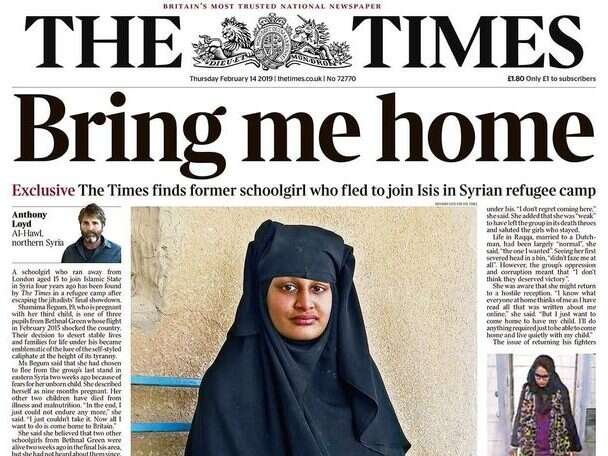
The Metropolitan Police has presented no “clear and compelling” grounds for seizing journalists’ notes from their interviews with ISIS bride Shamima Begum, the lawyer for media groups fighting the case in court said today.
The force wants full copies of edited and unedited recordings of interviews with Begum carried out by the Times and ITV News and the journalists’ full written notes made during or after the exchanges.
Sky News was also represented in court but police are no longer seeking a production order against them after receiving an assurance that mere seconds of footage from their interview with Begum went unbroadcast.
Begum was one of three girls who ran away from Bethnal Green in east London aged just 15 in February 2015 to travel to Syria and join the Islamic State terror group.
She was not heard from for four years until Times war correspondent Anthony Lloyd tracked her down in a refugee camp in northern Syria in February this year.
The teenager later gave interviews to other media outlets including the BBC, against which the Met is also seeking a production order. The BBC is not opposing the order in court.
Gavin Millar QC, representing Times Newspapers, ITN and Sky, told the Old Bailey today that the Met had not presented a “clear or compelling” case showing why it could interfere with the journalists’ and media organisations’ rights under Article Ten of the Human Rights Act.
Millar said: “We say there is no clear and compelling case, given in particular the high public interest value of the journalism, which… is a very strong factor against any interference [by police] of the press by way of a production order.
“The reports were of high public interest value as is apparent by the debate that has been provoked – public and journalistic debate.”
Millar told the court the police “haven’t shown on evidence” that the unpublished comments of Begum to each of the journalists would be likely to be of “substantial value” to their investigation against her.
Richard Horwell QC, representing the Met, told the court: “When evaluating a journalist’s article ten rights we submit that confidentiality, or the absence of it, is a very important ingredient and here there is no confidentiality.”
The Times and Sky News both published what they described as the full transcripts of their interviews with Begum on their websites.
However Horwell said the Times had published a 17-minute interview when it is known that Lloyd had a 22-minute recording on his phone.
Horwell also said Lloyd spent 90 minutes with Begum and that it was “fatuous” to suggest nothing might be of interest to a police investigation was discussed during that time.
He added: “[We are] not interested in how he [Lloyd] found her, how he got there, what sources he may have had, what route, whatever information, whatever suspicion. [We’re] not interested in that. It’s just her words.”
Millar claimed the missing five minutes of Lloyd’s recording only contained introductions and formalities, adding: “The fact that there are other minutes in Anthony Lloyd’s phone that didn’t end up being transcribed and written up is unsurprising.”
Horwell also argued that the first ITV News interview contained only Begum’s answers in the broadcast version and not the full questions and that to “evaluate the material properly the questions must be known”.
Millar raised concerns regarding the “inhibitive nature of production orders on journalistic activity and especially journalistic activity which is neutrally observing and reporting on events in the public interest”.
He said there was a balancing exercise to be done which “starts with the strong advantage to public interest journalists” who are “guaranteed high level protection from the courts for orders they don’t want to be made”.
“That’s why there must be a very compelling argument and it has to be established on the evidence,” he added.
“Police say it would be advantageous to hear the remaining material but that is not the test under article ten.
“It has to be sufficiently important to justify ordering journalists to hand it over and nothing we have heard in this court… comes close to meeting that requirement.”
Horwell dismissed the idea that journalists may be in danger if it became known that they had handed over material to the police.
He said it was a “remarkable” suggestion because the Times itself published an article earlier this week publicising the fact they were being asked to hand over documents to the police through a production order.
The case was heard by Judge Mark Dennis, who will give his ruling on 4 September.
Begum was represented in court by Adrian Waterman QC who held a neutral position in the case on her behalf.
Email pged@pressgazette.co.uk to point out mistakes, provide story tips or send in a letter for publication on our "Letters Page" blog
